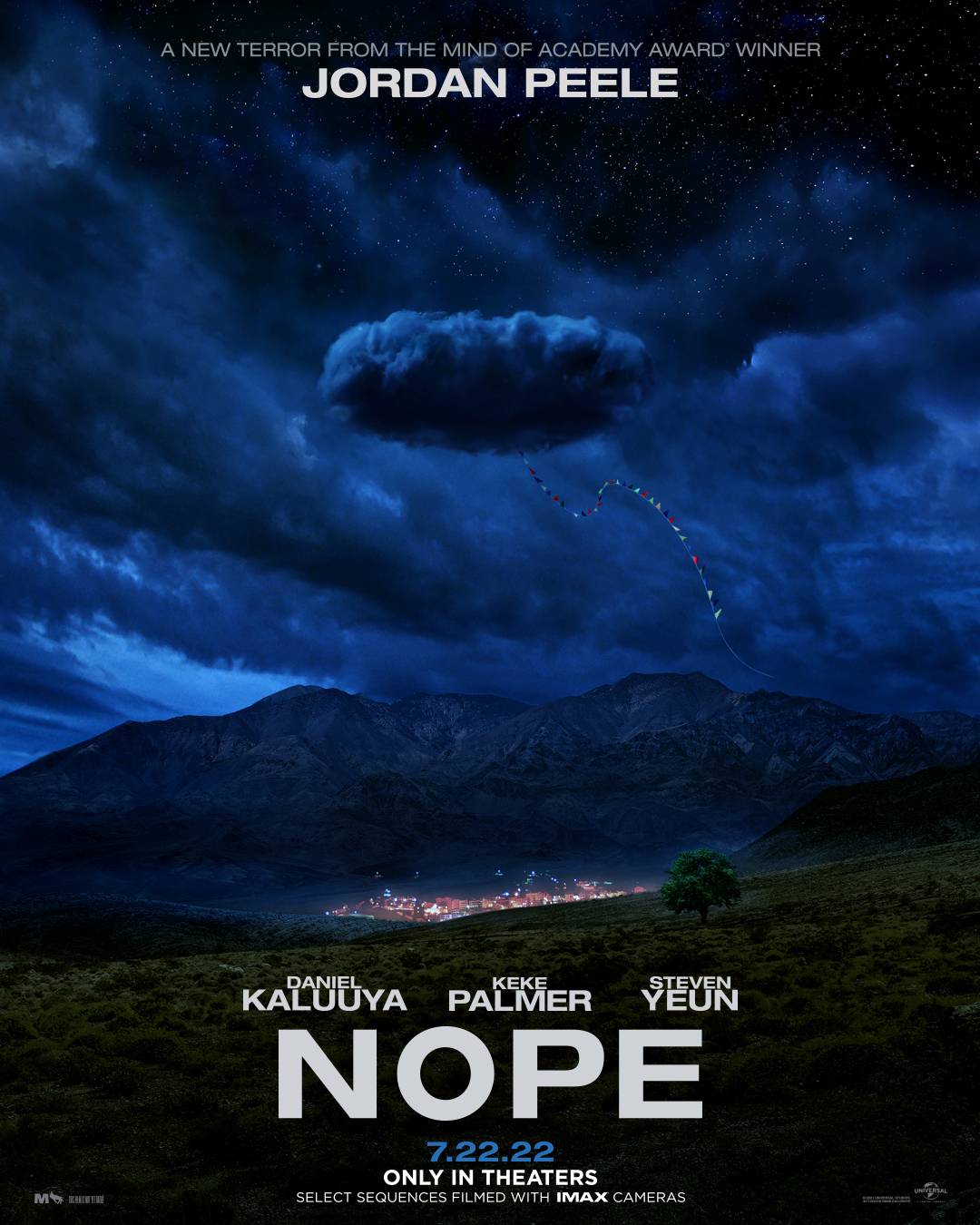
There is little doubt at this point that Jordan Peele is a master of filmmaking and has cemented himself as one of the leading writers and directors of modern horror. Through his short but impactful filmography, he has frequently subverted our expectations while balancing fear and comedy. Beyond this, he has also brought, in his own words, a form of “social horror” to the forefront of our consciousness by exploring, both covertly and overtly, the intrinsic horrors of our modern-day society.
While Nope successfully achieves much of this, Peele has yet to hit all of the right notes since his nearly perfect debut in Get Out. This can be attributed, perhaps, to the timing of his initial film, following the chaos of the 2016 presidential election and subsequent inauguration, emerging at a time when his social messaging was most salient. Or, we may have arrived at Peele’s subsequent films with heightened expectations, versus our simple curiosity at exploring a mostly comedic actor and writer’s foray into horror. Ultimately, for whatever reason it may be, Peele struck the “good but not great” chord with Us and has now done the same with Nope.
That being said, Nope has the makings of a brilliant film through the majority of its runtime. From the opening shot, Peele has the audience exactly where he wants them. Before a line of dialogue is delivered, Peele is able to shock the audience into wonder and prompt questions that are slowly answered as the film unravels. If one thing is clear upon watching this film, it is Peele’s utmost confidence in his direction. There are choices made, both in form and function, that would likely be too bold for a less confident filmmaker. While not all these choices hit their intended mark, it is difficult to leave the theatre without a sense of respect for the decisions that Peele is willing to make.
Among these choices is the narrative structure itself, an interweaving of seemingly separate narratives in an attempt to create a cohesive whole. While this successfully creates tension for the audience, the way that these stories ultimately connect feels incomplete. This is an example, of which there are several, of Peele’s reach extending slightly further than his grasp. This becomes increasingly disappointing, as the build-up through the first two acts is so impressive that you may be tempted to believe, for a brief period, that you are witnessing what could be one of the most brilliant horror films in years. Unfortunately, at times, Peele seems more concerned with capturing the perfect shot, rather than neatly tying together narrative threads.
Still, Peele does so much in this film, like his others, that remains unmatched by his peers. There is little doubt that he can be considered a “master of the moment”. Peele’s ability to create a shot that remains in the mind of the viewer should be admired. Get Out is certainly the best example of this, as five years later, I can still close my eyes and vividly picture Daniel Kaluuya, wide-eyed and teary, before his journey to the Sunken Place. While there is not a singular shot that stands alone like this in Nope, there are still several images that are sure to stay with the audience long after viewing.
Beyond being a “master of the moment”, Peele continues to subvert our genre expectations. On the surface, this film sets itself up as a classic UFO story, and it fits that bill through much of its 2-hour 11-minute run. However, as the story progresses, we come to realize that this is not your standard alien flick, and, in traditional Peele fashion, this alien lifeform comes to stand for the much deeper and much more real terror of gentrification. Em (Keke Palmer) and OJ (Daniel Kaluuya) find themselves fighting against this powerful intruder to save the land they grew up on. Peele’s ability to humanize a seemingly inhuman being is another example of his aptitude in using metaphor to shine a light on societal issues, albeit more subtly in Nope compared to his previous two films.
Not only does Peele manage to explore the plight of the working class, but he also successfully manages to subvert the white saviour trope. Unlike in Get Out, not all white folks are portrayed as literal evil, but there is still a clear power dynamic being explored, through both class and race. As working-class people of colour, the labour of Em and OJ is being exploited by the Hollywood elite and they are disregarded when they are no longer believed to bring value to the enterprise. As a result, our protagonists begin to think that they require the aid of the white elite to escape the ruins of their situation. By the end of the film, however, they realize that they do not require a saviour and are capable of making the most of their circumstances through their own ingenuity.
All of this being said, Nope does not stand solely as a think-piece on the power of the black working class. It is, quite thoroughly, balanced with levity and humour, as one might expect from Peele. Among these moments would be the first time that we hear a character express the titular “nope”. While it was obvious that this would occur at some point, the timing was effective in eliciting a genuine laugh from the audience, while also allowing Peele to put us briefly at ease before continuing to build tension. Beyond this, while Keke Palmer’s performance as Em seems to deliver the same joke in slightly different forms throughout the film, she is still largely effective in bringing lightness to the darker moments, particularly when she plays off Daniel Kaluuya’s more stoic OJ. In the end, it is Kaluuya’s performance that stands above the rest, as he continues to show the world that he should be considered one of the finest young actors working today.
Ultimately, Nope is beautifully written and shot through its first two acts, which makes the final act all that much more disappointing. Still, there are enough moments in this film to make it more than worth watching. After three feature films, Peele’s creativeness and confidence continue to grow, and we are lucky to have such a mind working in Hollywood today.
Link to the trailer: https://www.youtube.com/watch?v=In8fuzj3gck
Link to my Letterboxd: https://letterboxd.com/PointsofReview/





Great read! Big Perle fan in comedy and horror. Also, great insight into “social horror.”
Much appreciated! If only we could all be that talented.
I think that Peele advertised this as an alien movie when reality it was just (like you said) a ‘social horror.” I think that’s why many people were bummed out (as was I) about it.
There was certainly enough “alien spectacle” there to satisfy a lot of people, but you’re definitely right. It almost seems like it’s trying to be several different things at once, rather than fully committing.